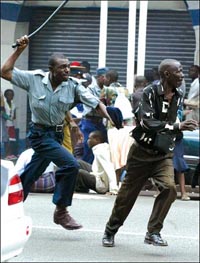Opposition leader scanned for suspected skull fracture, brain injury
Zimbabwe's main opposition leader suffered a suspected skull fracture, brain injury and internal bleeding, doctors reported Wednesday, after what lawyers and other activists said were savage beatings while in police custody.

Morgan Tsvangirai told the British Broadcasting Corp. in an interview from his hospital bed that police beat him on the head, and that he suffered body blows to the knees and back, and that his arm was broken. He said he "lost a lot of blood" and that he was given two pints.
"I think the intent was to inflict as much harm as they could," he said.
Tsvangirai, 54, was moved to a unit where he could be more closely monitored and was awaiting the results of a brain scan carried out earlier Wednesday, said Tafadza Mugabe, one of his lawyers.
Tsvangirai was among a dozen allegedly beaten by police who remained hospitalized Wednesday, their lawyers said. Another 34 were released early Wednesday from the private hospital in Harare where they had been taken after a court appearance Tuesday, Mugabe said. All were arrested as police broke up an opposition prayer meeting on Sunday.
Those freed were told to return to the Harare magistrates' court when it opened Wednesday, but amid chaos at the court no proceedings were held and the activists returned to their homes.
Beatrice Mtwetwa, another lawyer for the group, and police were not present at the court.
"If they want us, the police can call us," she said.
Innocent Chagonda, another Tsvangirai lawyer, said police withdrew from the Harare clinic where the opposition leader was being treated later Wednesday.
He noted that because a High Court order issued late Monday ordered police to charge or release the opposition leaders and activists by noon on Tuesday, and none was charged.
"As far as we are concerned, they are now free men," Chagonda said.
Tsvangirai, leader of the main opposition Movement for Democratic Change, and colleagues from other opposition and civic groups were ferried in ambulances and buses from the magistrates' court Tuesday after the state agreed to let all those detained receive medical attention.
Many of them sustained severe bruising and internal injuries after police raided a prayer meeting Sunday that authorities had declared illegal. One opposition activist, identified as Gift Tandare, was shot dead by police Sunday.
William Bango, one of Tsvangirai's aides who was sent home from hospital Wednesday told reporters that he and the other detainees were beaten repeatedly by police at the scene of arrest and police stations.
"We were made to lie on our stomach and they beat with batons and iron bars. When one group of police got tired another started on us," said Bango, who suffered bruising and internal pain.
Tsvangirai was beaten savagely in the same way and bled heavily, he said. Later the opposition leader received a transfusion of about one liter of blood while under treatment, Bango added.
The events have renewed questions about how long Zimbabwean President Robert Mugabe can maintain his tight grip on power amid deteriorating economic, political and social conditions. The violence also has drawn international condemnation.
A statement Wednesday from Germany, which holds the European Union presidency, said it noted the release of the activists and said their safety and well-being was the responsibility of the Zimbabwean government.
The unions said "it was deeply concerned to learn of the serious injuries suffered by the opposition leaders as a result of maltreatment."
Ghanaian President John Kufuor, who holds the rotating African Union chairmanship, added his voice Wednesday.
"The situation in (Zimbabwe) is very embarrassing," he told an audience at the Royal Institute of International Affairs in London.
"I know personally that presidents like (South Africa's Thabo) Mbeki tried desperately to exercise some influence for the better," he said. "Please don't think that Africa is not concerned. Africa is very much concerned. What can Mbeki as a man do? Are you proposing that Africa compose an expedition team to march on Zimbabwe and oppose? It does not happen like that."
South Africa, the region's political and economic leader, has followed a policy of "quiet diplomacy," arguing that working behind the scenes would do more to encourage reform in Zimbabwe than isolating Mugabe. But Mbeki has been under pressure to do more. His deputy foreign affairs minister, Aziz Pahad, issued a statement Tuesday saying South Africa was concerned about the declining political and economic situation in Zimbabwe.
U.S. Secretary of State Condoleezza Rice Tuesday called Mugabe's regime "ruthless and repressive."
Mugabe's opponents blame him for acute food shortages, inflation of some 1,600 percent _ the highest in the world and repression and corruption. They have demanded the ouster of 83-year-old Mugabe, Zimbabwe's only ruler since independence from Britain in 1980.
Information Minister Sikhanyiso Ndlovu said opposition activists had attacked police and were to blame for the latest violence, according to state radio.
Authorities suspected an "underground movement" of opponents was planning a violent campaign against the government, he said.
Nathan Shamuyarira, chief spokesman for Mugabe's ruling party, said Tsvangirai defied a police ban on Sunday's meeting, reports AP.
"Tsvangirai really asked for the trouble in which he has found himself," he told South African state television.
Subscribe to Pravda.Ru Telegram channel, Facebook, RSS!


